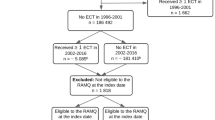Summary
Bipolars treated with electroconvulsive therapy (ECT) during the index episode were matched on the variables of age, sex, previous admissions and previous hospitalizations with 23 bipolars who did not receive ECT. A similar match was made for 42 unipolars who were under the age of 40 at time of admission. All patients were followed for 5 years. Those patients treated with ECT, both bipolars and unipolars, had the same numbers of episodes in follow-up as their matched groups. However, in both bipolar and unipolar ECT-treated patients, there were more follow-up rehospitalizations. The reason for this is not known but three possibilities exist. Successful treatment with ECT may make the family and patient more prone to consider rehospitalization. Secondly, the originally treated ECT patients may have had more aggressive doctors who were more likely to rehospitalize. Finally, ECT may change the course of an individual's illness in such a way that more severe episodes occur and rehospitalizations are necessary. The findings suggest the need for long-term studies following ECT on clinical and biological variables.
Similar content being viewed by others
References
Abrams R (1988) Convulsive therapy. Oxford University Press, New York
Avery D, Winokur G (1978) Suicide, attempted suicide and relapse rates in depression. Arch Gen Psychiatry 35:749–753
Black D, Winokur G, Nasrallah A (1987) The treatment of mania: electroconvulsive therapy versus lithium. J Clin Psychiatry 48: 132–139
Coryell W, Keller M, Endicott J, Andreasen N, Clayton P, Hirschfeld R (1989) Bipolar II illness: course and outcome over a 5 year period. Psychol Med 19: 129–141
Coryell W, Lavori P, Endicott J, Keller M, VanEerdewegh M (1984) Outcome in schizoaffective, psychotic and non-psychotic depression. Arch Gen Psychiatry 120:787–791
Coryell W, Winokur G, Andreasen N (1981) Effect of case definition on affective disorder rates. Am J Psychiatry 183:1106–1109.
Endicott J, Spitzer R (1978) A diagnostic interview: the schedule for Affective Disorders and Schizophrenia. Arch Gen Psychiatry 35:837–844
Endicott J, Spitzer, R, Fleiss J (1976) The Global Assessment Scale: a procedure for measuring overall severity of psychiatric disturbance. Arch Gen Psychiatry 33: 766:711
Huston P, Locher L (1948a) Involutional psychosis. Arch Neurol Psychiatry 59:385–394
Huston P, Locher L (1948b) Manic-depressive psychosis. Arch Neurol Psychiatry 60:37–48
Katz M, Secunda S, Hirschfeld R, Koslow S (1979) NIMH Clinical Research Branch Collaborative Program on the psychobiology of depression. Arch Gen Psychiatry 36:765–771
Keller M, Klerman G, Lavori P, Coryell W, Endicott J, Taylor J (1984) Long-term outcome of episodes of major depression. JAMA 252:788–792.
Keller M, Lavori P, Friedman B, Nielsen E, Endicott J, McDonald-Scott P, Andreasen N (1987) The longitudinal, interval followup evaluation. Arch Gen Psychiatry 44:540–548
Klerman G (1978) Long term treatment of affective disorders. In: Lipton M, DiMascio A, Kellam K (eds) Psychopharmacology, a generation of progress, Raven, New York
Shapiro R, Keller M (1979) Longitudinal Interview Follow-up Evaluation (LIFE). Massachusetts General Hospital, Boston
Wesner R, Winokur G (1989) The influence of age on the natural history of unipolar depression when treated with electroconvulsive therapy, Eur Arch Psychiatry Neurol Sci 238:149–154
Winokur G (1979) A family history (genetic) study of pure depressive disease. In: Mendlewicz J, Shopsin B (eds) Genetic aspects of affective illness. Spectrum, New York
Winokur G (1983) Controversies in depression or, do clinicians know something after all? In: Clayton P Barrett J (eds) Treatment of depression, old controversies and their approaches. Raven, New York
Winokur G, Kadrmas A (1988) Convulsive therapy and the course of bipolar illness, 1940–1949. Conv Ther 4:126–132
Author information
Authors and Affiliations
Additional information
From the National Institute of Mental Health Collaborative Program on the Psychobiology of Depression-Clinical Studies, conducted with the participation of the following investigators: G. L. Klerman (Chairperson) (New York); R. M. A. Hirschfeld (Co-Chairperson) (Washington, D. C.); M. B. Keller and P. Lavori (Boston); J. A. Fawcett and W. A. Scheftner (Chicago); W. Coryell, N. C. Andreasen, J. Haley (Iowa City); J. Endicott and J. E. Loth (New York); J. Rice and T. Reich (St. Louis). Other contributors include: P. J. Clayton; J. Croughan; M. M. Katz; E. Robins; R. W. Shapiro; R. L. Spitzer and George Winokur. This manuscript has been reviewed by the Publication Committee of the Collaborative Program and has its endorsement.
Rights and permissions
About this article
Cite this article
Winokur, G., Coryell, W., Keller, M. et al. Relationship of electroconvulsive therapy to course in affective illness: A collaborative study. Eur Arch Psychiatry Clin Nuerosci 240, 54–59 (1990). https://doi.org/10.1007/BF02190094
Received:
Issue Date:
DOI: https://doi.org/10.1007/BF02190094




